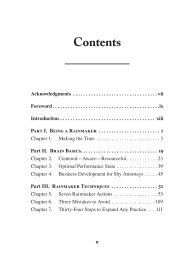(Bk Business) Carol Kinsey Goman Ph.D.-The Nonverbal Advantage_ Secrets and Science of Body Language at Work -Berrett-Koehler Publishers (2008)
Just
Just
Create successful ePaper yourself
Turn your PDF publications into a flip-book with our unique Google optimized e-Paper software.
Chapter 3: <strong>The</strong> Eyes Have It<br />
45<br />
But people also decrease or avoid eye contact when they<br />
are discussing something intim<strong>at</strong>e or difficult, when they are<br />
not interested in the other person’s reactions, when they<br />
don’t like the other person, when they are insecure or shy<br />
(as Daniel was in the interview situ<strong>at</strong>ion), <strong>and</strong> when they are<br />
ashamed, embarrassed, depressed, or sad.<br />
Waiters in restaurants tend to avoid eye contact with customers<br />
when they need to send the message “I’m too busy<br />
to deal with you right now.” Employees avoid eye contact<br />
when the boss poses a difficult question. (<strong>The</strong> general rule<br />
is to look down <strong>and</strong> shuffle through notes as if searching for<br />
the answer.) And when pedestrians or drivers want to ensure<br />
their own right <strong>of</strong> way, one str<strong>at</strong>egy is to avoid meeting the<br />
other’s eyes to avoid cooper<strong>at</strong>ion.<br />
Neg<strong>at</strong>ive Eye Contact: Staring<br />
Staring is a bold <strong>and</strong> direct gaze th<strong>at</strong> is continuous, <strong>and</strong> it’s the<br />
one example <strong>of</strong> increased eye contact th<strong>at</strong> does not increase<br />
liking. In fact, most <strong>of</strong> us consider staring to be rude or even<br />
thre<strong>at</strong>ening. This kind <strong>of</strong> overdone eye contact generally<br />
communic<strong>at</strong>es a desire to domin<strong>at</strong>e, a feeling <strong>of</strong> superiority,<br />
a lack <strong>of</strong> respect, or a wish to insult. During a convers<strong>at</strong>ion,<br />
when someone challenges wh<strong>at</strong> we are saying, she may hold<br />
our gaze for longer periods <strong>of</strong> time, but her eye contact will<br />
feel “hard” <strong>and</strong> her pupils will be constricted.<br />
Darting Eyes<br />
Darting eyes have been linked with deceit so <strong>of</strong>ten th<strong>at</strong> it’s<br />
almost become a cliché. But if you see this eye gesture from<br />
someone, keep an open mind about the motive behind it.<br />
While darting eyes reliably signal the presence <strong>of</strong> heightened<br />
emotion, th<strong>at</strong> emotion may or may not mean th<strong>at</strong> someone




